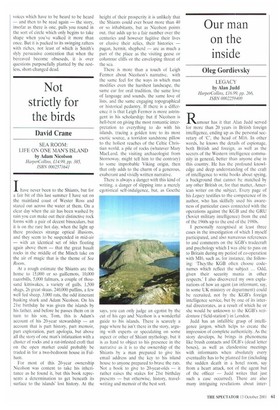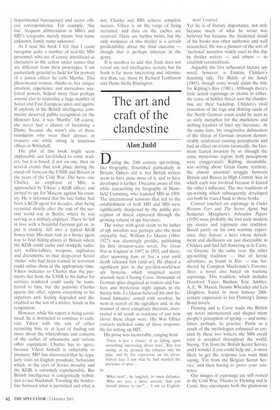Our man on the inside
Oleg Gordievsky
LEGACY by Alan Judd HarperCollins, £16.99, pp. 266. ISBN 0002259400 Rumour has it that Alan Judd served for more than 20 years in British foreign intelligence, ending up as the personal secretary of 'C', the head of M16. In other words, he knows the details of espionage, both British and foreign, as well as the secrets of the Western intelligence community in general, better than anyone else in this country. He has the profound knowledge and deep understanding of the craft of intelligence to write books about spying, a background that cannot be matched by any other British or, for that matter, American writer on the subject. Every page of his Legacy testifies to the competence of its author, who has skilfully used his awareness of particular cases connected with the operations against the KGB and the GRU (Soviet military intelligence) from the end of the 1960s up to the end of the 1980s.
I personally recognised at least three cases in the investigation of which I myself participated, and also numerous references to and comments on the KGB's tradecraft and psychology which I was able to pass on to Britain during my period of co-operation with MI6, such as, for instance, the following: 'They/the KGB often choose codenames which reflect the subject ... Odd, given their security mania in other respects.' I also discovered my own explanations of how an agent (an informant, say, in some UK ministry or department) could be recruited, not by the KGB's foreign intelligence service, but by one of its internal directorates, as a result of which he or she would be unknown to the KGB's rezidentura ('field-station') in London.
Judd has an infallible grasp of intelligence jargon, which helps to create the impression of complete authenticity. As the story develops, he brings in phenomena like brush contacts and DLB's (dead letter boxes), as well as clandestine meetings with informants when absolutely every eventuality has to be planned for (including the sudden death in a hotel room, say from a heart attack, not of the agent but of the officer — Judd writes that just such a case occurred). There are also many intriguing revelations about inter departmental bureaucracy and secret official correspondence. For example, Inu fnu', frequent abbreviation in MI6's and MI5's telegrams, merely means 'first name unknown, family name unknown'.
As I read the book I felt that I could recognise quite a number of real-life MI6 personnel, who are of course introduced as characters in the action under names that are different from their prototypes. I am particularly grateful to Judd for his portrait of a junior officer he calls Martha. This phenomenal woman, thanks to her unique intuition, experience and meticulous analytical powers, helped more than perhaps anyone else to neutralise a huge number of Soviet and East European spies and agents. If anybody in the British intelligence community deserved public recognition on the Honours List, it was 'Martha'. Of course, she never had a chance of becoming a Dame, because she wasn't one of those mandarins who wear their dresses or trousers out while sitting in luxurious offices in Whitehall.
The plot of this book might seem implausible and far-fetched to some readers, but it is based, if not on one, then on several events that took place during the stand-off between the USSR and Britain in the years of the Cold War. The hero, one Charles, an employee of MI6, is approached by Viktor, a KGB officer, and invited to spy for Moscow against his country. He is informed that his late father had been a KGB agent for decades, after being recruited shortly after the end of the second world war in Berlin, where he was serving as a military engineer. There he fell in love with a beautiful German girl or, to put it crudely, fell into a typical KGB honey-trap. His main task as a Soviet agent was to find hiding-places in Britain where the KGB could cache and stockpile radiosets, walkie-talkies, weapons, explosives and documents, so that deep-cover Soviet 'moles' who had been trained in terrorism could utilise them at the appropriate time. Viktor indicates to Charles that the payments due from the USSR to his father for services rendered could easily be transferred to him, but the patriotic Charles spurns this offer, reports everything to his superiors and, feeling degraded and discredited as the son of a traitor, hands in his resignation.
However, while his report is being scrutinised, he is instructed to continue to cultivate Viktor with the aim of either recruiting him, or at least of finding out more about the whereabouts and contents of the caches of armaments and various other equipment. Charles has to agree, because Viktor himself is vulnerable to pressure: MI5 has discovered that he regularly visits an English prostitute, behaviour which, in the eyes of Soviet morality and the KGB, is extremely reprehensible, But British intelligence is categorically forbidden to use blackmail. Treading the borderline between what is permitted and what is not, Charles and MI6 achieve complete success. Viktor is on the verge of being recruited, and data on the caches are received. There are further twists, but the only weakness of this thriller is a certain predictability about the final outcome — though that is perhaps inherent in the genre.
It is needless to add that Judd does not reveal any real intelligence secrets; but his book is far more interesting and informative than, say, those by Richard Tomlinson and Dame Stella Rimington.



























































































 Previous page
Previous page